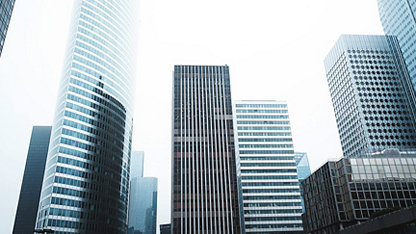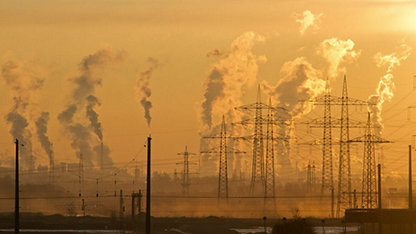A fragile economy, disruptive new technologies, an ageing wrkforce and a climate emergency. Is it time to run for cover, or just the moment to grasp the initiative? We asked three experts for their bright sides.
1. Technology: fears over future are redundant
Andrew Waller MRICS, Partner, UK, Remit Consulting
Real estate is reluctant to automate. The industry generates a lot of data and, if you automate a lot of the processes that capture all this information, the traditional skills that people have developed – such as networking – become less useful. In real estate, the fear is that all this automation is going to take away people's ability to make money.
However, change is inevitable, and some people are right to fear that change. For example, parsing long leases and drafting changes is a task that can be automated. So if you're a lawyer and that's how you make your money, your skills are going to have to evolve, but it isn't an existential threat. The next generation will have those skills and will expect something different from their working lives.
There's been a lot of talk about proptech and a lot of money going into it, but fundamentally there has been little change to date. However, the big funds are spending big on artificial intelligence and experimenting with blockchain. They recognise the opportunities and we are starting to see changes in business models based on the use of data. There is a Dutch firm that has got rid of its asset managers and now employs four "quants" who analyse 120,000 data points every day, and then make decisions based on that analysis.
Then there is Woolbright Development in Florida, which analyses data from shopping centres and, when it finds one that it thinks is underperforming, it investigates the economics of the area. It analyses the retail data that it can get and picks out two or three retailers that it thinks would do well in that location. Then it goes to see those retailers and asks: "If we buy this shopping centre, will you go in?" If they say yes then it buys the centre, puts those retailers in, turns it around and then sells it on.
There are other opportunities, too. Because we have all this extra data, we know what our customers are thinking and we can start to make decisions about how their environment can be improved, whether that's in terms of living space, shopping or working in an office. Data can be used to enhance the user experience, making your property more valuable than the one next door.

Change is inevitable within real estate, and the next generation will have the skills to incorporate these technological advancements, argues Andrew Waller MRICS
2. Workforce: older, wiser...and better off?
Patrick Thomson, Senior Programme Manager, Centre for Ageing Better
There are definitely some issues with having an ageing population, such as increased spending on the state pension and the additional funds needed for health and social care. But there are opportunities as well.
We know that the older population has considerable consumer spending clout, and contributes a lot back into the economy and society. Many of us are living for longer but we are also working for longer. The rate of employment for the over-50s has been increasing since the mid-1990s, which is helping to provide the workers that the economy needs. There is a big economic driver in people staying in productive work for longer and, ultimately, spending their money and further contributing to the economy.
With the UK's state pension age due to rise to 68 in 2028, people are being encouraged to work further into their old age. This has become possible because, generally speaking, we are in better health and living longer than ever before. In the past, many people developed health problems as a result of working in heavy industry, and consequently were forced out of work. A decline in manual labour jobs, plus improvements in workplace health and safety, mean that is less the case these days.
I also think that people's attitudes have changed. The idea that you might retire early or start winding down from the age of 50 has changed. There are opportunities to work into your 70s and beyond if you so wish. But there are still big inequalities. People who work in low-skilled, low-wage jobs might not have the luxury of deciding when to retire, and are at greater risk of redundancy as they get older.
But it is clear from our research that employers value having older workers. When surveyed, employers mention factors such as experience and loyalty to the organisation. Older workers have amassed a lifetime of skills and experience, and often their employers say that they have better interpersonal skills, which helps them manage conflict in the workplace.
Often employers say that having older and younger members of staff working alongside each other allows skills to be transferred between generations – and that works in both directions. So, there are huge benefits that older workers can bring to the table, but ultimately having a workforce that represents the age profile of the population as a whole is a good thing. We want people of all ages working together.
3. Climate change: an opportunity to save the world
Julie Hirigoyen, Chief Executive, Uk Green Building Council
When did we start taking climate change seriously? I would point to the Intergovernmental Panel on Climate Change report that came out in 2018. That was the moment we recognised that urgent action is needed to keep the temperature rise globally to 1.5ºC. If we are to a achieve that, then we absolutely have to achieve carbon neutrality by 2050.
We know that our buildings account for around 30% of our carbon emissions. So, it is a very significant proportion of our carbon footprint, but it is also one of the most cost-effective abatement levers. The interventions needed to make both new and existing buildings zero carbon are considered to be some of the most cost-effective ways of decarbonising our economy. Buildings might be a massive part of the problem, but they also represent a massive opportunity.
There is mounting evidence that the cost of acting early will be easier to bear than the cost of acting later. This will present opportunities for early adopters, and conversely a huge risk for those slow to act. We have to expect that ever-tighter and more demanding policies aimed at reducing carbon in buildings will be introduced in years to come, so there is a real danger that inefficient properties will become obsolete.
“The cost of acting early will be easier to bear than the cost of acting later”
Julie Hirigoyen
Chief Executive, UK Green Building Council
And obviously, by adapting existing stock or building better new buildings, you can also create more resilient and therefore more valuable assets in the longer term. But there are also other upsides. The UK Green Building Council has been working to demonstrate the tangible benefits that green buildings offer businesses through health and productivity gains.
In addition, today's workforce – particularly millennials – are increasingly interested in working for more ethical employers, many of whom occupy greener spaces. Businesses that follow suit, therefore, have an opportunity to futureproof their workforces.
There are also significant socio-economic benefits – whether that's reduced energy bills or improved physical and mental health – to be derived from investing in reducing carbon emissions by retrofitting our existing housing stock. And then there are jobs that could be created right across the country. There is a massive opportunity, and there is more and more green finance available to do it. In the coming months and years that will unlock opportunities in retrofitting.
The popularity of green buildings also has an impact on market demand, from both investors and occupiers. We are seeing a massive rise in interest in environmental, social and governance issues from investors, who are taking a closer look at sustainability performance. Ultimately, I think the biggest driver in shifting the market will be this demand for more sustainable buildings.

Julie Hirigoyen states that the decarbonising of buildings is incredibly cost effective, and represents a great opportunity for progress in the built environment sector
- We explore these opportunities in the next RICS Futures report, coming in early 2020. Sign up to receive it at rics.org/futureprofession
- This article originally appeared in the Start-Up issue of Modus (October 2019)













